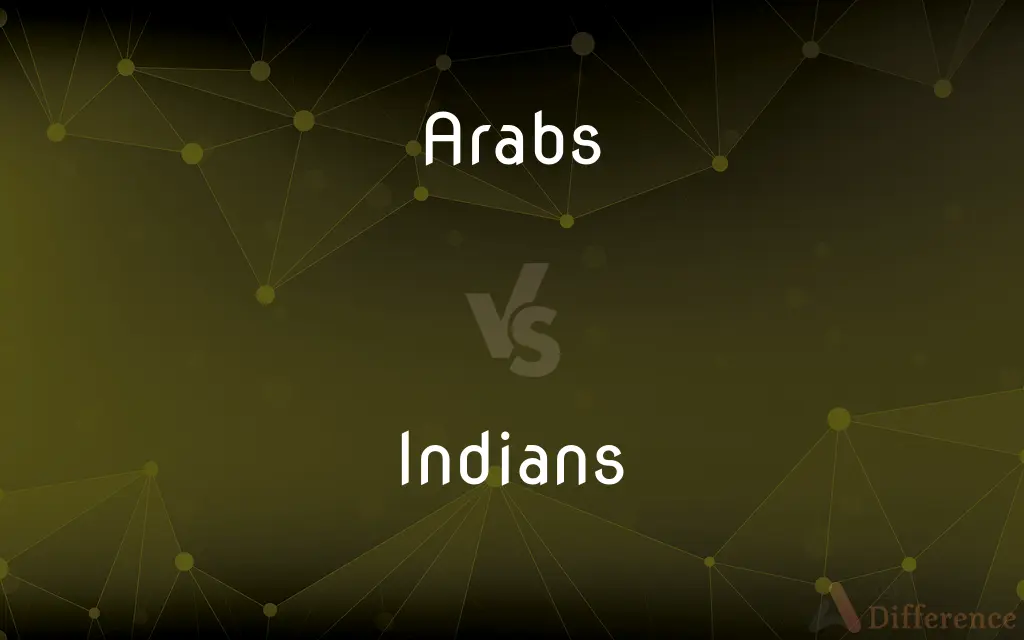Arabs vs. Indians — What's the Difference?
Edited by Tayyaba Rehman — By Fiza Rafique — Published on December 26, 2023
Arabs are primarily associated with the Arabian Peninsula and speak Arabic, while Indians are from India and primarily speak Hindi among other languages.

Difference Between Arabs and Indians
Table of Contents
ADVERTISEMENT
Key Differences
Arabs trace their origins to the Arabian Peninsula, a vast desert region in Western Asia. This land includes modern-day countries like Saudi Arabia, Yemen, and parts of Jordan, Iraq, and others. Indians, on the other hand, hail from India, a vast subcontinent in South Asia known for its diverse geography, from the Himalayas in the north to the coastal plains in the south.
Arabs predominantly speak Arabic, a Semitic language with numerous dialects depending on the region. Arabic is written from right to left and has its own unique script. Indians mainly communicate in various languages, with Hindi (written in the Devanagari script) being the most widespread. However, India recognizes 21 other official languages, including Bengali, Telugu, and Marathi.
The predominant religion among Arabs is Islam, and they played a significant role in its history and spread. The Five Pillars of Islam play an essential part in their daily lives. Indians, conversely, predominantly practice Hinduism, though the country has a rich tapestry of religions including Islam, Christianity, Sikhism, Buddhism, and Jainism.
Arabs have a rich heritage in poetry, literature, and science. The Golden Age of Islamic Civilization brought advances in various disciplines. Indians have an extensive historical background in arts, sciences, and philosophy. Ancient India was home to the Indus Valley Civilization and foundational texts like the Vedas and Upanishads.
Cuisine varies across the Arab world but is centered around staple foods like dates, wheat, barley, rice, and meat. Indian cuisine, known for its spices and flavors, varies regionally but generally includes staples like rice, wheat, lentils, and a plethora of vegetables.
ADVERTISEMENT
Comparison Chart
Region of Origin
Arabian Peninsula
India
Predominant Language
Arabic
Hindi among 21 other official languages
Writing Direction
Right to left
Left to right
Major Religion
Islam
Hinduism (with diverse religious practices)
Typical Cuisine
Dates, wheat, barley, rice, meat
Rice, wheat, lentils, spices, vegetables
Compare with Definitions
Arabs
Native speakers of the Arabic language.
Many Arabs are fluent in multiple dialects of Arabic.
Indians
Inhabitants of India.
The Indians have diverse cultural and regional practices.
Arabs
People who trace their lineage to Arab ancestry.
The Arabs have spread to various parts of the world, contributing to global diversity.
Indians
Individuals who identify with Indian culture and traditions.
The Indians celebrate a wide variety of festivals throughout the year.
Arabs
Inhabitants of the Arabian Peninsula.
The Arabs have a rich history that dates back thousands of years.
Indians
People who trace their lineage to Indian ancestry.
Overseas communities of Indians have left a mark in various countries.
Arabs
Citizens of countries in the Arab League.
The Arabs have a cooperative body known as the Arab League that addresses regional issues.
Indians
Citizens of the Republic of India.
The Indians are proud of their democratic and secular values.
Arabs
Individuals who identify with Arab culture and traditions.
The Arabs celebrate various festivals with great enthusiasm.
Indians
Native speakers of any of the languages recognized by the Indian constitution.
Many Indians are bilingual or even trilingual.
Arabs
A member of a Semitic people inhabiting Arabia, whose language and Islamic religion spread widely throughout the Middle East and northern Africa from the seventh century.
Indians
Of or relating to India or the East Indies or to their peoples, languages, or cultures.
Arabs
A member of an Arabic-speaking people.
Indians
Of or relating to any of the Native American peoples except the Aleut, Inuit, and Yupik.
Arabs
An Arabian horse.
Indians
A native or inhabitant of India or of the East Indies.
Indians
A person of Indian or East Indian ancestry.
Indians
A member of any of the Native American peoples except the Aleut, Inuit, and Yupik.
Indians
Any of the languages of these peoples. See Usage Notes at American Indian, First Nation, Native American.
Indians
See Indus2.
Indians
Plural of indian
Common Curiosities
Who are the Arabs?
Arabs are people originally from the Arabian Peninsula, primarily speaking the Arabic language.
What languages do Indians speak?
Indians primarily speak Hindi, but there are 21 other officially recognized languages in India.
Who are the Indians?
Indians are people from India, speaking various languages with Hindi being the most prevalent.
Are all Arabs Muslim?
While Islam is predominant among Arabs, there are Christian, Jewish, and other religious minorities.
Is Hindi the only language spoken in India?
No, India is home to numerous languages, with Hindi being just one of the 22 officially recognized languages.
What religions do Indians practice?
Indians predominantly practice Hinduism, but there are significant populations of Muslims, Christians, Sikhs, Buddhists, and others.
What is the significance of the Arab League?
The Arab League is a regional organization aimed at promoting economic, cultural, and political cooperation among its member states.
What is a typical Indian meal?
A typical Indian meal may include rice or roti (wheat bread), lentils, vegetables, and meat or fish, seasoned with various spices.
What language do Arabs speak?
Arabs predominantly speak Arabic with numerous dialects across regions.
What script is Arabic written in?
Arabic is written in the Arabic script.
In what script is Hindi written?
Hindi is written in the Devanagari script.
What are some staple foods in Arab cuisine?
Staples in Arab cuisine include dates, wheat, barley, rice, and meat.
Are all Arabs Arabs ethnically?
No, the Arab identity is multi-faceted, including linguistic, cultural, and political dimensions. Not everyone in the Arab world is of pure Arab descent.
Is India ethnically homogeneous?
No, India is ethnically diverse with various ethnic groups, languages, and cultural practices.
Share Your Discovery

Previous Comparison
Saturated Solution vs. Unsaturated Solution
Next Comparison
Kodiak Bear vs. Grizzly BearAuthor Spotlight
Written by
Fiza RafiqueFiza Rafique is a skilled content writer at AskDifference.com, where she meticulously refines and enhances written pieces. Drawing from her vast editorial expertise, Fiza ensures clarity, accuracy, and precision in every article. Passionate about language, she continually seeks to elevate the quality of content for readers worldwide.
Edited by
Tayyaba RehmanTayyaba Rehman is a distinguished writer, currently serving as a primary contributor to askdifference.com. As a researcher in semantics and etymology, Tayyaba's passion for the complexity of languages and their distinctions has found a perfect home on the platform. Tayyaba delves into the intricacies of language, distinguishing between commonly confused words and phrases, thereby providing clarity for readers worldwide.
















































